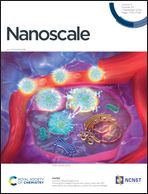A sustainable natural nanofibrous confinement strategy to obtain ultrafine Co3O4 nanocatalysts embedded in N-enriched carbon fibers for efficient biomass-derivative in situ hydrogenation†
Abstract
Both exploring high-performance catalytic materials with ultrafine active sites from sustainable feedstocks and selective transformation of bio-renewable carboxides are very significant and challenging topics. Herein, we utilized bacterial cellulose to construct highly dispersed Co3O4 nanocatalysts embedded within nitrogen-doped carbon nanofibers (NCNFs). Benefiting from the nanofibrous confinement strategy, a urea-assisted carbonation process and a mild nitrate decomposition process, the cobalt precursor was transformed into ultrasmall and homogeneous Co3O4 nanoparticles (NPs) of ca. 1.57 nm, which is to our knowledge the smallest value among the reported supported Co3O4 materials. The as-obtained Co3O4/NCNF exhibits superior catalytic activity for the selective hydrogenation of bioderived α,β-unsaturated aldehydes with 2-propanol as a H-source, yielding 90–100% conversion under mild conditions. Controlled experiments and detailed characterization revealed that the three-dimensional nanofibrous porous structure can be favourable for improved diffusion and mass transfer, while the uniform distribution of ultrafine Co3O4 NPs and urea-derived abundant basic sites exhibit synergism in the adsorption and activation of reactants, which contributes to excellent catalytic performance. This approach opens up a new way to the design and fabrication of highly dispersed nanocatalysts based on NCNF materials from sustainable natural polymers for biomass valorization.

- This article is part of the themed collection: 2020 Nanoscale HOT Article Collection


 Please wait while we load your content...
Please wait while we load your content...